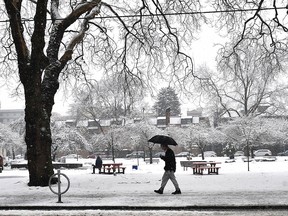ICBC said claims soared 160 percent after last week’s first winter wave, 3,581 as of Monday, and is asking drivers to heed safety advice.

Article content
(SENT TO SAXO) The series of collisions and fender benders from last Thursday’s blast of winter weather, which coincided perfectly with the overnight trip, caused insurance claims to skyrocket 160 percent over a normal day , according to ICBC.
That has its road safety experts pleading with drivers to take precaution number one to avoid a repeat of the road chaos as forecasts call for another spell of snow, expected to turn to rain, on Tuesday night: stay off the roads.
Advertisement 2
Article content
Article content
“Don’t drive, stay home if you can,” said Shabnem Afzal, ICBC’s director of road safety.
Last Thursday’s flurry of snow arrived at the same time as temperatures plummeted, freezing early moisture into pure ice and contributing to a series of cascading accidents that caused hours-long traffic jams on major commuter routes. of Metro Vancouver.
As of Monday morning, ICBC recorded 3,581 claims across the province during Thursday’s commute, compared to a daily average of 1,381, according to the corporation.
The BC Automobile Association said roadside assistance calls were up 90 per cent above usual volume Friday night with 2,266 calls, mostly to deal with dead batteries.
Now Environment and Climate Change Canada is forecasting that a Pacific storm system heading toward the coast Tuesday night will begin producing snow starting at midnight, dumping 10 to 20 cm of snow in Metro Vancouver and 15 to 35cm in the Fraser Valley by the end of Wednesday. .
“That’s a considerable amount of snow for us,” Environment Canada meteorologist Alyssa Charbonneau said Monday. “I think the main concerns from a travel perspective would be the rapid accumulation of snow, snow on the roads and reduced visibility, especially in parts of the Fraser Valley.”
Article content
Advertisement 3
Article content
Charbonneau said there is a possibility of wind and blackout conditions in exposed parts of the Fraser Valley throughout Wednesday.
That reinforces Afzal’s advice: Run errands when the roads are clear, stay home when you can, and change plans, if possible, when it comes to going to the office instead of working from home.
For those who cannot avoid traveling, Aszal said drivers should be prepared. Do not drive unless you have snow tires, allow extra travel time, dress appropriately, and carry emergency kits in your cars that include scrapers, shovels, blankets, food, water, and means to stay warm such as candles.
“Be prepared for the worst-case scenario in those cases if you’re going to be on the road,” Aszal said.
Last week, highway maintenance crews were hampered in keeping up with changing road conditions because their trucks became stuck in the same traffic jams as commuters, which were often caused by a handful of collisions.
Aszal said ICBC typically sees the number of collisions increase by 91 percent each year in January because drivers are driving too fast for the conditions.
Advertisement 4
Article content
“You can’t do business as usual,” he said. “When there is snow and ice, you have to slow down and also increase your following distance. “That’s really important if you have to stop unexpectedly.”
“We are really anticipating this bad weather, so be prepared,” Aszal said.
Recommended by Editorial
-

Cold snap drives record energy consumption in British Columbia
-
Mission Memorial Hospital emergency room closed after burst pipe flooded unit
Bookmark our website and support our journalism: Don’t miss the news you need to know – add VancouverSun.com and LaProvincia.com to your favorites and subscribe to our newsletters here.
You can also support our journalism by becoming a digital subscriber – for just $14 a month you can get unlimited access to The Vancouver Sun, The Province, National Post and 13 other Canadian news sites. Support us by subscribing today: The Vancouver Sun | The province.
Article content

